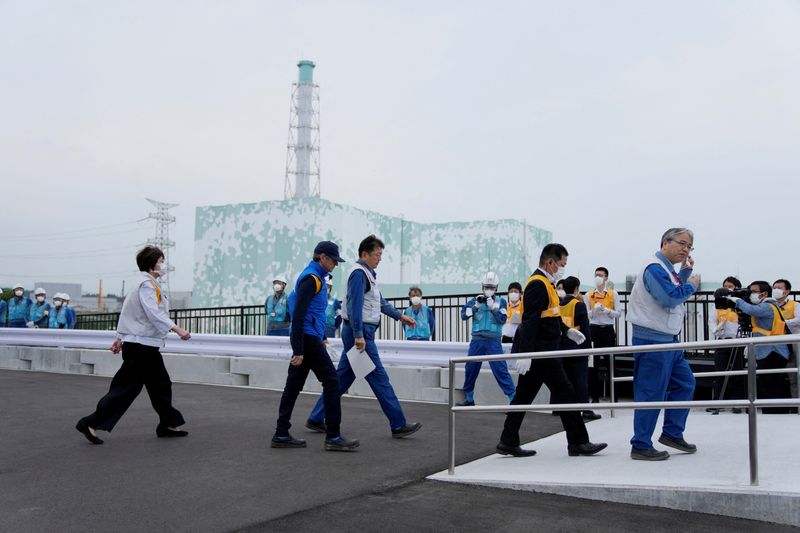Analysis-Fukushima water release poses early test for Japan-South Korea unity
2023.08.17 19:45
2/2

© Reuters. FILE PHOTO: Rafael Mariano Grossi, Director General of the International Atomic Energy Agency, second left, arrives to inspect the damaged Fukushima nuclear power plant as Tomoaki Kobayakawa, President of Tokyo Electric Power Co., third left, escorts him
2/2
By Tim Kelly, Sakura Murakami and Hyonhee Shin
TOKYO/SEOUL (Reuters) – U.S. President Joe Biden wants to lock in friendly ties between Japan and South Korea at a summit on Friday, but their readiness to shelve grievances will be tested when Tokyo begins pumping water from its wrecked Fukushima nuclear plant into the sea.
Japan already delayed the release to avoid stirring up political opposition in South Korea before President Yoon Suk Yeol joins Japanese Prime Minister Fumio Kishida for a meeting with Biden at the Camp David retreat on Friday, four officials in Japan and South Korea told Reuters.
The dumping of radioactive water may happen days after the summit, which the U.S. is billing as a “historical” trilateral meeting that will deliver a “bold counter” to regional rival China.
That puts less domestic political pressure on Yoon, said one of the officials, who asked not to be identified because of the sensitivity of the issue.
Washington needs its Asian allies to work together because they see the military power balance in East Asia, including around Taiwan, shifting in China’s favour. Beijing is also deepening cooperation with Russia in the region, and their mutual ally North Korea is accelerating its missile program.
“The trilateral is a significant move in the geopolitical landscape like AUKUS was for the defense landscape,” U.S. Ambassador to Japan Rahm Emanuel said at a briefing on Aug. 11, referring to the 2021 defence pact between the United States, Australia and Britain.
YOON’S DETENTE
Unlike his more combative liberal predecessor, Moon Jae-in, Yoon has played down unresolved disputes, such as compensation for Korean women forced into Japanese military brothels during World War Two, that have dogged relations for years.
Even if Fukushima fades as an issue, the risk of bad blood remains real. As relations soured in 2019, for example, Moon nearly scrapped a critical intelligence-sharing deal with Japan, reversing the decision at the last minute under U.S. pressure.
By accepting an International Atomic Energy Agency (IAEA) report last month that greenlit Japan’s Fukushima water release, Yoon could encourage fresh dissent that China will try to amplify, analysts say.
“There is certainly some possibility that Yoon will come under pressure over this, particularly if there is data that shows that the water is more dangerous than we otherwise thought,” said Christopher Johnstone, a former East Asia director of Biden’s National Security Council who is now with the Center for Strategic and International Studies.
Japan says it will remove most radioactive elements from the water except for tritium, a hydrogen isotope that must be diluted because it is difficult to filter.
Seoul expects Tokyo to share information, allow access to its experts, and immediately halt any dangerous releases, a Yoon administration source said, adding that those steps will help facilitate security cooperation.
On Monday, Park Gu-yeon, vice minister of government policy coordination at the prime minister’s office, said both sides have made “substantial progress” on the water release issue. A senior South Korean official, speaking on condition of anonymity because of diplomatic sensitivity, said the government did not see it as a source of friction.
A Japanese foreign ministry spokesperson said Tokyo would continue to work closely with Seoul.
U.S. Secretary of State Antony Blinken on Tuesday expressed satisfaction with Japan’s plans.
“Japan has coordinated closely, proactively, with the IAEA on its plans, and they’ve conducted a science-based and transparent process,” he said.
CHINESE INFLUENCE
Protests against the release have so far been muted, at least by South Korean standards, with just a few hundred people gathering in Seoul on Saturday to demand a halt. The political fallout for Yoon has also been limited; his approval rating has recovered after dipping when Seoul endorsed the IAEA findings.
Nonetheless, a Gallup poll in late June showed that 78% of South Koreans worry about potential contamination of the ocean and seafood. Some analysts say China may see an opportunity to exert influence.
“China absolutely will try to exploit Fukushima to drive a wedge between South Korea and Japan,” said David Boling, a director at consulting firm Eurasia Group. “The opposition party has been critical of Yoon for not taking a tougher stance on Fukushima.”
Beijing has banned seafood imports from 10 Japanese prefectures, including Fukushima, and is testing produce from elsewhere.
China will try to sway sentiment in South Korea with disinformation, state media, and spending to influence politicians and thought leaders, said Joshua Kurlantzick, a senior fellow at the Council on Foreign Relations who tracks how it influences other nations.
In July, Chinese foreign ministry spokesman Wang Wenbin said Japan had shown selfishness and arrogance, and had not fully consulted the international community about the water release.
The IAEA has criticised what it says is a fabricated document a South Korean media site used in June to claim Tokyo had unduly influenced the organisation. In July the state-backed Chinese newspaper Global Times, which has published stories questioning the safety of Japanese produce and casting doubt on the IAEA’s findings, picked up the report.
Reuters has not been able to confirm the document’s origin.
China’s government did not immediately respond to requests for comment.
On Tuesday, Japanese Chief Cabinet Secretary Hirokazu Matsuno took aim at other “fake” documents that the same South Korean site said showed radioactivity in the Fukushima water exceeded safety standards.
“It greatly hurts the feelings of the people who are striving for reconstruction” in Fukushima, he said.








